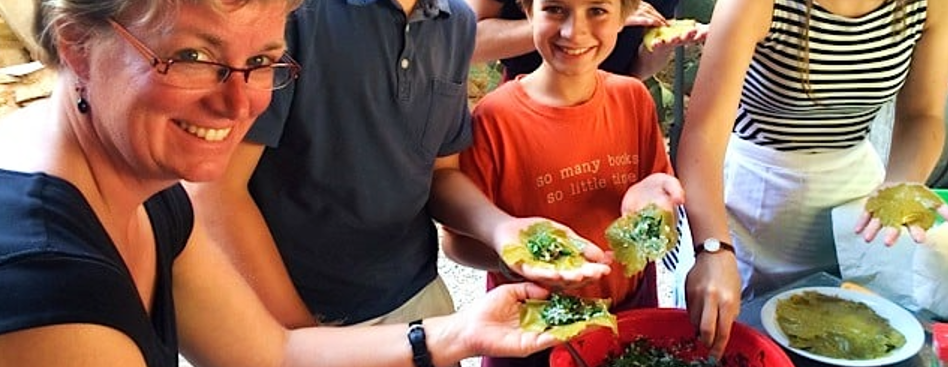Crete, the largest of the Greek islands, is a treasure trove of culinary delights. The island’s cuisine, rooted in ancient traditions and influenced by various cultures over millennia, is renowned for its simplicity, flavor, and health benefits. For food enthusiasts and travelers alike, taking a cooking class in Crete offers a unique opportunity to delve into the heart of Greek cuisine, learn from local experts, and bring home the skills to recreate authentic dishes. Here’s a guide to what you can expect from cooking classes in Crete and why they are a must-do experience.
1. Why Take a Cooking Class in Crete?
Authenticity and Tradition: Cretan cooking classes offer a hands-on experience with traditional recipes passed down through generations. You’ll learn the secrets behind the island’s iconic dishes, such as dakos (a barley rusk salad), moussaka, and slow-cooked lamb with stamnagathi (wild greens).
Local Ingredients: Crete’s cuisine is heavily based on fresh, locally sourced ingredients. Cooking classes often include a visit to local markets or farms, where you can select seasonal produce, herbs, and the island’s famous olive oil. This farm-to-table approach ensures you understand the importance of high-quality ingredients.
Health Benefits: The Mediterranean diet, particularly the Cretan version, is celebrated for its health benefits. Learning how to cook with olive oil, fresh vegetables, legumes, and lean meats not only enhances your culinary skills but also promotes a healthier lifestyle.
Cultural Immersion: Cooking classes provide more than just recipes; they offer insights into the Cretan way of life. You’ll hear stories about the history of the dishes, the significance of food in local customs, and even learn a few Greek phrases.
2. Types of Cooking Classes
Traditional Cooking Classes: These classes are often held in rustic village kitchens or family homes. You’ll be guided by local cooks who share their family recipes and culinary wisdom. Classes typically start with a tour of the local market or garden to pick fresh ingredients.
Farm-to-Table Experiences: Some cooking classes take place on farms or in eco-villages, where you can harvest your own vegetables and herbs before cooking. These experiences emphasize sustainable practices and organic farming.
Wine and Food Pairing Classes: For those interested in oenology, some classes combine cooking with wine tasting. You’ll learn how to pair Cretan wines with various dishes, enhancing the flavors of both food and drink.
Seafood Specialties: Given Crete’s coastal location, seafood is a staple in its cuisine. Specialized classes focus on preparing fresh fish, octopus, and other seafood delicacies, teaching you techniques to highlight the natural flavors of the sea.
Dessert and Pastry Classes: Cretan desserts, such as kalitsounia (sweet cheese pastries) and honey-drenched loukoumades (fried dough), are a delight. These classes teach the art of creating traditional Greek sweets, perfect for those with a sweet tooth.
3. What to Expect in a Cretan Cooking Class
Hands-On Learning: Most classes are highly interactive, allowing you to get involved in every step of the cooking process. From chopping vegetables to kneading dough, you’ll gain practical skills.
Guidance from Experts: Classes are typically led by experienced local chefs or home cooks who provide detailed instructions and tips. Their passion for Cretan cuisine is infectious and makes learning enjoyable.
Cultural Insights: Beyond cooking techniques, instructors share stories about the cultural and historical background of the dishes. This storytelling aspect enriches the learning experience and connects you to Cretan heritage.
Enjoying Your Creations: After the cooking session, you’ll sit down to enjoy the fruits of your labor. Sharing a meal with fellow participants and your instructor is a highlight, offering a chance to taste a variety of dishes and savor the authentic flavors.
Recipe Booklets: Many classes provide printed or digital recipes, so you can recreate the dishes at home. Some even offer tips on where to find authentic ingredients outside of Crete.
4. Popular Cooking Schools in Crete
Cretan Culinary Sanctuaries: Known for their immersive experiences, they offer farm-to-table classes that focus on organic ingredients and sustainable practices. Their classes are held in picturesque locations, providing a serene backdrop for cooking.
Cretan Flavors Cooking School: Located in Chania, this school offers a variety of classes, from traditional Cretan dishes to modern Greek cuisine. They also offer market tours and wine tasting sessions.
The Olive Farm: Situated near the town of Kissamos, The Olive Farm combines cooking classes with olive oil tastings and tours of their organic farm. It’s an ideal place to learn about the importance of olive oil in Cretan cooking.
Tastes of Crete: This cooking school offers classes in Heraklion and includes visits to local markets, wineries, and archaeological sites. It’s perfect for those who want to combine cooking with sightseeing.
5. Conclusion
Taking a cooking class in Crete is more than just a culinary lesson; it’s a journey into the island’s soul. You’ll leave with not only new cooking skills but also a deeper appreciation for Cretan culture and the Mediterranean diet. Whether you’re a novice cook or a seasoned chef, these classes offer something for everyone, making your stay in Crete even more memorable. So, roll up your sleeves, embrace the flavors of Crete, and bring a piece of this beautiful island back to your own kitchen.


